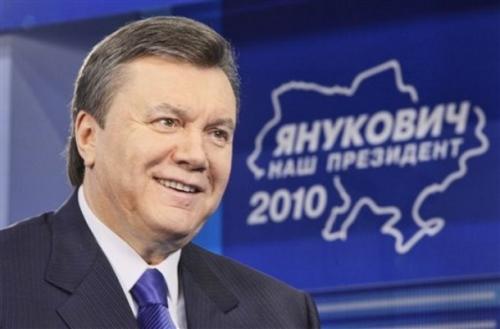
The triumph of Viktor Yanukovych in Ukraine’s presidential election on Sunday marks the remarkable political comeback of a man who was the pariah of the Orange Revolution of 2004. Despite derisive portrayals (in the media and by his rival Yulia Tymoshenko) of Mr. Yanukovych as an ex-convict, authoritarian, and captive of the Kremlin who would reverse Ukraine’s democratic progress and block its march toward the European Union, he was elected narrowly but clearly on Sunday by a margin of 49.5% to 45%, according to an average of independent exit polls.
Given the country’s strategic significance, and the Kremlin’s persistent interest in reclaiming Ukraine for Russia’s sphere of influence, it is important that the world have a clear picture of Ukraine’s new leader.
 Mr. Yanukovych’s biography is as rich and contradictory as Ukraine’s tumultuous transition from Soviet rule to democracy, sovereignty, and the free market. His youth seems ripped from a Dickens novel—an orphan growing up in grinding poverty in an industrial backwater in eastern Ukraine, he spent his teenage years as a gang member who was twice arrested and convicted for assault and theft. Though both sentences were quashed in the late 1970s, allowing him to aspire to high office, Mr. Yanukovych admits to great regrets about his adolescence.
Mr. Yanukovych’s biography is as rich and contradictory as Ukraine’s tumultuous transition from Soviet rule to democracy, sovereignty, and the free market. His youth seems ripped from a Dickens novel—an orphan growing up in grinding poverty in an industrial backwater in eastern Ukraine, he spent his teenage years as a gang member who was twice arrested and convicted for assault and theft. Though both sentences were quashed in the late 1970s, allowing him to aspire to high office, Mr. Yanukovych admits to great regrets about his adolescence.
Eventually, he earned a degree in mechanical engineering, and for nearly twenty years he worked as a manager in Ukraine’s transportation sector, eventually becoming the governor of Donetsk, Ukraine’s populous steel and coal-mining region.
In 2002, he replaced Viktor Yushchenko as Ukraine’s prime minister, and was handpicked to replace then-President Leonid Kuchma in the 2004 election. That election was so marred by fraud that it sparked the Orange Revolution and the victory of Mr. Yushchenko’s team of democratic reformers.
Many of the high expectations of the Orange Revolution were unmet amid bitter political infighting and rampant corruption. But, notwithstanding the chaos, "Orange" rule also deepened Ukraine’s political pluralism, and allowed time for the political transformation of Mr. Yanukovych and his Party of Regions.
First, the oligarchs around Mr Yanukovych became economically transparent. They hired first-rate managers, rigorously paid their taxes, promoted sophisticated philanthropy, and became globalized in their tastes and manners. Just as importantly, they now see their future prosperity integrally linked to a reduction in corruption, the expansion of free market policies, lower taxes, fewer regulations, and Ukraine’s eventual integration into the rich EU market.
Second, Mr. Yanukovych and other Regions leaders have become public personalities irrespective of some rough edges, and have accustomed themselves and found success in the democratic rules of the game. Five years in the political wilderness has taught them that the world does not end with the democratic rotation of power, nor does it put anyone’s massive fortunes at risk.
Third, after his political setbacks in 2005 and 2007, Mr. Yanukovych and his allies were treated dismissively and—say some of his closest confidantes—humiliated by Vladimir Putin and the Kremlin. This, and Mr. Putin’s tilt last year toward Ms. Tymoshenko, have created distance between the Regions leadership and Moscow. Coupled with Kyiv’s need to extract Ukraine from its deep economic decline, and a state budget deficit of 12%, this means the world can expect Mr. Yanukovych to eagerly work for close cooperation with Europe and the U.S., not to mention the International Monetary Fund.
Indeed, the signals emanating from Mr. Yanukovych’s closest aides, as well as key leaders from the Our Ukraine coalition with whom I met last week in Kyiv, suggest the new president and the government he will try to bring into office will likely represent a broad-based mix of longtime Regions party officials, and competent financial and economic technocrats and market reformers—including some from the former Yushchenko team. For instance, there is a good chance that banker Serhiy Tyhypko, who finished a strong third in the presidential race, will be offered the prime minister’s post rather than Mr. Yanukovych’s longtime ally and campaign director, Mykola Azarov, who is also under serious consideration. The odds of a broad-based coalition are reinforced by the modesty of Mr. Yanukovych’s victory, clear-cut though it was.
All this means that, should the political coalition under discussion take root, Ukraine will at last achieve an interval of political stability and economic policy consensus. Ironically, that means Mr. Yanukovych’s presidency may move further toward fulfilling the promises of the Orange Revolution than the fractious rule of Yushchenko-Tymoshenko ever did.
Adrian Karatnycky is a senior fellow with the Atlantic Council. This essay previously appeared in the Wall Street Journal.
Ukraine Presidential Election 2010 Blog Series:
- Ukraine Elections: Let’s Not Get Carried Away – Nikolas Gvosdev
- Re-Introducing Viktor Yanukovych – Adrian Karatnycky
- EU Energy Security May Depend on Ukraine Election Runoff – Alexandros Petersen
- Ukraine Election: A Yushchenko Post-Mortem – Adrian Karatnycky
- Ukraine Presidential Results: Calling it Right – Adrian Karatnycky
- Yanukovych Comes Out On Top, But Tymoshenko Has Momentum – Damon Wilson
- Ukraine Election Day: First Thoughts – Adrian Karatnycky
- A Glass Half Full: Contemplating a Yanukovych Presidency – Nikolas Gvosdev
- Ukraine’s Anti-Orange Election – Alexander J. Motyl
- Ukraine Election Backgrounder – Adrian Karatnycky